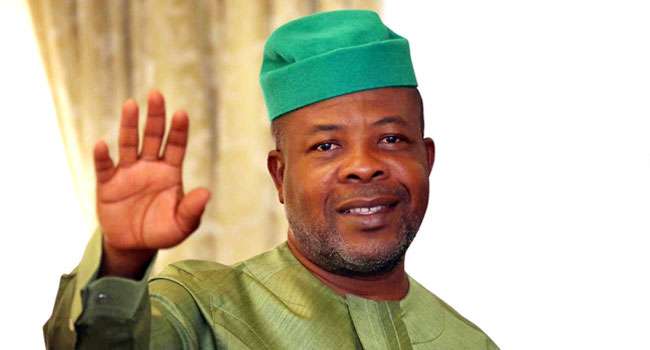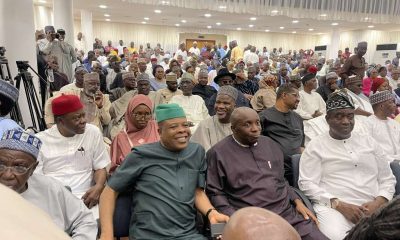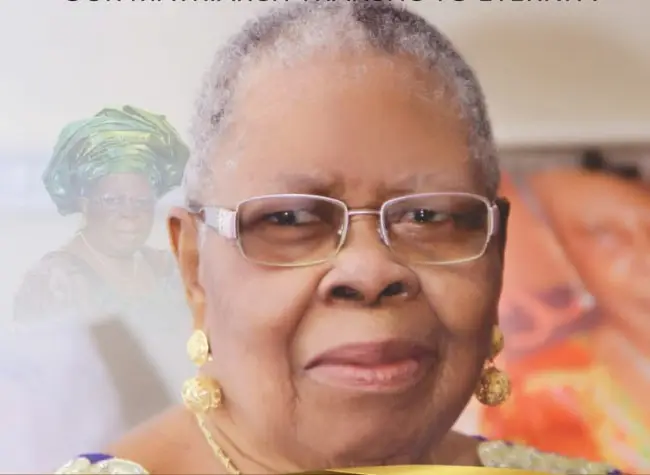Politics
2027: Calls intensify for Emeka Ihedioha to reclaim Imo governorship

There is a growing clamour for the return of Rt. Hon. Emeka Ihedioha, CON, KSC, as governor of Imo State in 2027.
The Rebuild Imo Movement (RIM), which he founded, continues to resonate across all 27 Local Government Areas of the state, positioning itself as a formidable grassroots platform. Recent investigations by Business Hallmark reveal that RIM remains the most popular political movement in Imo State, despite the All Progressives Congress (APC) being in power.
Ugwumba Damien Ezeagu, convener of Imo State Critical Stakeholders—a faction of RIM—explained the basis of Ihedioha’s enduring support. “Ihedioha resigned from the PDP in April last year and has remained without a party since. Yet, millions of Imo people still rally around him. Without any financial inducement, people connect with Ihedioha because he represents integrity, honour, and character,” said Ezeagu, a former PDP state secretary once nicknamed “Kofi Annan” for his diplomacy.
Backing his sentiments, RIM Women Leader for Owerri Zone, Lolo Getrude Iroeme, stated, “When you meet Ihedioha, you see a man whose integrity is defined by consistency. He served in the House of Representatives for 12 years, rising to Deputy Speaker and later Acting Speaker, and has never been accused or investigated by any anti-graft agency. That’s commendable.”
Iroeme added that Ihedioha’s message has remained consistent over the years—from his early campaigns in 2003 through 2019 and even now—centered on true democracy, fiscal federalism, and the rule of law. “These are the ideals Imo people yearn for, and Ihedioha embodies them,” she said.
Sir Stanley Ekezie, another RIM stalwart from Okigwe Zone, praised Ihedioha’s administrative capabilities. “He’s a leader with exceptional administrative acumen. His appointments are merit-based, reflect quality, and ensure geographical balance. He thinks ahead and implements policies that solve both present and future challenges.”
Ekezie recalled Ihedioha’s impressive track record during his brief seven-month tenure as governor, highlighting impactful policies that brought hope and development to key sectors like health, education, agriculture, transportation, and infrastructure. “It was a defining moment for Imo. That’s why his influence has not waned and why he remains on the path to 2027.”
Observers and citizens alike argue that Ihedioha stands in the same league as some of Imo’s most celebrated leaders—Ndubuisi Kanu and Sam Mbakwe. His short stint in office rekindled public faith in governance and democratic institutions.
“Ihedioha’s legacy in just seven months is already the stuff of legend,” one analyst noted. “He brought the kind of innovative and people-driven leadership we last saw during the Mbakwe era. Under him, Imo was declared the least corrupt state in Nigeria.”
Imo also emerged as the fastest-growing economy in Nigeria at the time and was ranked as the most improved state, particularly in leveraging Information Technology for service delivery. Infrastructure saw significant upgrades, and civil servants and pensioners were paid consistently—restoring confidence and optimism.
Sports development also flourished under his administration. The then Minister of Sports, an APC Federal Executive Council member, lauded Ihedioha’s efforts, declaring, “Imo is now the home of sports in Nigeria. The Federal Government should emulate the state’s programmes.”
Recognizing the critical role of local government in governance, Ihedioha empowered the third tier of administration, turning LGAs into engines of development. His administration initiated the construction of 27 mini-stadiums, built new secretariats, and launched road rehabilitation projects across all 27 LGAs, totaling 308.7 kilometers.
To support these efforts, he released a N500 million counterpart fund to qualify for a N13.5 billion World Bank grant under the Rural Access and Mobility Project (RAMP).
Economically, Ihedioha introduced an Ease of Doing Business Desk and revitalized the Imo State Investment Promotion Agency (ISIPA). He secured an N18 billion Quality Assurance Facility from AfriExim Bank and increased Internally Generated Revenue (IGR) from N250 million in June to over N850 million monthly by October 2019.
His adoption of the Treasury Single Account (TSA), a federal initiative, was widely applauded for improving transparency and financial discipline in state revenue management.
In education, Ihedioha prioritized rebuilding the future. He upgraded the state’s four technical colleges through the Technical & Vocational Education Training (TVET) programme, fostering vital skills among youths. He also paid the state’s counterpart funding to SUBEB and approved the recruitment of 4,000 teachers to bridge gaps in public education.
His administration also oversaw agricultural reform, promoted industrialization, improved healthcare delivery, and ensured adequate security across the state.
Central to all these accomplishments, stakeholders argue, is Ihedioha’s unshakable integrity. Despite years in public service—including 12 in the National Assembly—he has remained scandal-free, surviving scrutiny from both anti-corruption agencies and political rivals.
It is this unblemished record, combined with a clear development vision, that continues to fuel calls for his return to Douglas House in 2027.









